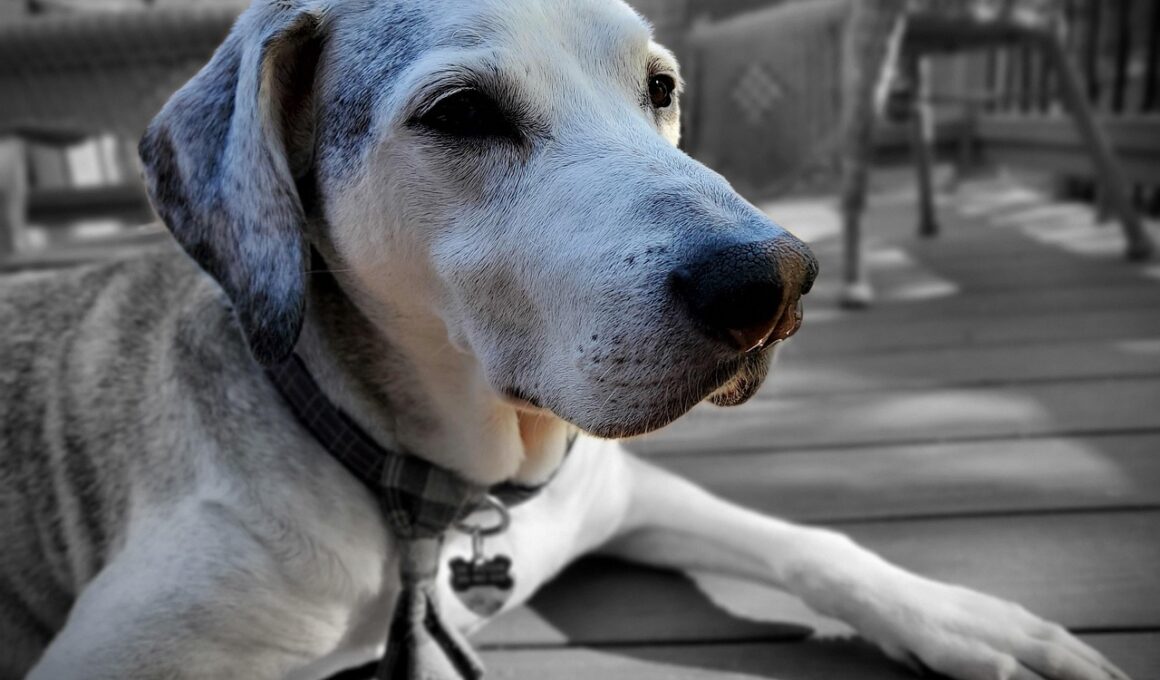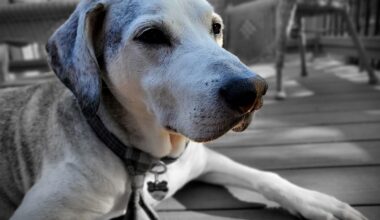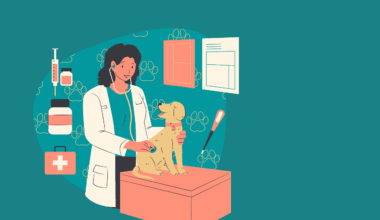Understanding REM Sleep in Senior Dogs
REM sleep, or Rapid Eye Movement sleep, is a crucial stage in a dog’s sleep cycle, especially for senior dogs. During REM sleep, your dog experiences vivid dreams and important physiological changes. This phase generally occurs every 90 minutes and can last 20 to 40 minutes. For older dogs, it becomes essential as it promotes brain health, aids memory function, and preserves overall cognitive abilities. It is characterized by physical movement such as twitching or paddling. If you notice your dog exhibiting this behavior, it’s a sign they are in REM sleep. Just like humans, dogs also experience non-REM and REM cycles. Understanding this can help dog owners recognize their pet’s sleep habits and needs. Not all senior dogs will exhibit the same duration or frequency of REM sleep as younger dogs. Environmental factors can also influence these patterns, including comfort and safety. Create an ideal sleeping space for your pet that minimizes stressors, like noise. The right environment can enhance the quality of REM sleep, thus benefiting your senior dog’s overall health and happiness. Ensure regular veterinary checkups to assess any underlying health issues that might disrupt sleep.
Another way you can enhance REM sleep for your senior dog is by maintaining a consistent sleeping schedule. Dogs, like humans, thrive on routine. Having a regular bedtime can promote better sleep quality. This could also involve establishing a relaxing bedtime ritual that includes gentle petting or quiet time. Older dogs are often more sensitive to changes in their environment or routine, which can lead to anxiety that disrupts their sleep patterns. Furthermore, consider the bedding and location where your dog sleeps. A comfortable bed that supports their joints can significantly impact their sleep quality. Senior dogs commonly suffer from arthritis or muscle stiffness, making proper bedding essential. Memory foam or orthopedic beds can provide relief and improve their sleeping experience. Additionally, monitor your dog’s food intake and schedule. Feeding them a few hours before bedtime can prevent discomfort during the night. Avoid heavy meals close to bedtime. Just like humans, dogs need time to digest their meals before they rest. Adjusting these small aspects of their routine can lead to more restorative sleep. A good night’s rest is vital for their physical and mental well-being, making it essential to prioritize their sleep environment.
Symptoms of Sleep Disruption
If you suspect that your senior dog is not achieving quality sleep, there are several symptoms to watch for. Behavioral changes, such as increased irritability or lethargy during the day, can signal sleep disruption. Look for signs of consistent restlessness during the night or difficulty settling down for sleep. You may also notice increased frequency of nighttime trips outside, which can indicate discomfort or an inability to relax. Excessive yawning or pacing are also indicators that your dog isn’t resting well. Additionally, vocalizations like whining or barking at night can indicate anxiety or confusion. These behaviors might be more pronounced in senior dogs due to age-related cognitive decline, often referred to as Canine Cognitive Dysfunction. If you observe these behaviors, consult your veterinarian to rule out any medical concerns and get advice on improving sleep quality. It is crucial to ensure that their physical health is prioritized. Implementing changes in diet, exercise, and environment can dramatically improve your dog’s sleep patterns. With their overall well-being supported, you will notice a significant improvement in their quality of life, ensuring that your furry friend remains comfortable and happy.
Another important factor to consider regarding senior dog sleep is their visual and auditory senses. As dogs age, they may experience sensory declines that could disrupt their sleep. Loss of vision or hearing can lead to anxiety, especially during the nighttime hours. As a dog becomes less visually aware, they may have a harder time navigating their environment at night. To make them feel secure, use nightlights or keep their sleeping area familiar and clutter-free. Eliminating sudden noises that might startle them can also help reduce anxiety and promote better sleep. Many older dogs respond positively to calming sounds like soft music or white noise machines. These changes create a peaceful sleeping atmosphere, consequently aiding in their REM sleep quality. Moreover, it’s essential to provide them with companionship. If your dog is particularly anxious, allowing them to sleep in proximity to you can help ease their fears and improve their sleep. Sometimes, a simple presence can set their mind at ease. Comfort and security are paramount in achieving restorative sleep, particularly as they age. A few strategic adjustments can foster a more relaxed and conducive sleeping environment for your beloved companion.
Nutrition for Better Sleep
Nutrition plays a pivotal role in your senior dog’s overall health and sleep quality. A balanced diet tailored to their age and health needs can foster better sleep patterns. Foods high in antioxidants, omega fatty acids, and essential vitamins can promote brain health and support cognitive function. Giving your dog proper nutrition is not just about what they eat, but also when they eat. Implementing a feeding schedule can enhance their digestive comfort, especially as they age. Avoid high-energy foods close to bedtime as they can lead to restlessness. Instead, consider feeding lighter meals in the evening. Additionally, ensuring that your dog stays hydrated is crucial; dehydration can lead to discomfort and sleep disruptions. Have fresh water easily accessible to them at all times. If your dog has specific dietary restrictions or health conditions like diabetes or kidney issues, consult with a veterinarian to create a diet plan aligning with their sleep needs. Ensuring optimal nutrition can be incredibly effective in supporting their sleep. A good diet can propel your dog toward healthier sleep patterns, making an enormous difference in their overall well-being, energy levels, and stress management.
In conclusion, understanding REM sleep in senior dogs is paramount for their health and longevity. As they age, their sleep cycles may change, requiring more attention from pet owners. Recognizing the signs of good sleep and its disruptions can enable you to implement effective strategies to support your dog’s resting routines. Create a serene and cozy sleeping environment free from disturbances, while keeping their physical and emotional needs in mind. Regular vet check-ups can help detect underlying issues affecting their sleep quality. Also, as mentioned before, establishing a consistent routine can significantly benefit their overall sleep experience. Whether it’s maintaining an appropriate diet, providing comfort through bedding, or emotional support, these small changes can yield remarkable results in your dog’s sleep quality. Don’t underestimate the power of quality sleep, as it significantly impacts their health. Through informed decision-making regarding their lifestyle, nutrition, and environment, you will ultimately enhance their quality of life. Dogs give us unconditional love, and ensuring their comfort is a rewarding part of pet ownership. Let’s create the best sleeping habits possible for our furry companions, helping them age gracefully and happily.
Finally, if you have any concerns about your senior dog’s sleep patterns, consult your veterinarian for expert guidance tailored to your pet’s specific needs. By understanding the nuances of senior dog sleep requirements, you can foster a healthier, happier life for them. Sleep is vital, and with proper support, your dog can continue to enjoy those restful nights well into their golden years. While some changes may seem small, they can profoundly affect your dog’s daily life. Take the time to observe your dog’s behavior and make necessary adjustments to support their health and well-being. All these efforts reflect your love and care for them. After all, a happy dog leads to a happy home. Provide them with the comfort they need while ensuring their safety at all times. Always remain patient and understanding, as every dog’s response to aging and health changes is unique. Your bond with your senior dog can also deepen as you learn to accommodate their changing needs. Cherish these moments and create the best environment for relaxation, ensuring they are content and well-rested.



